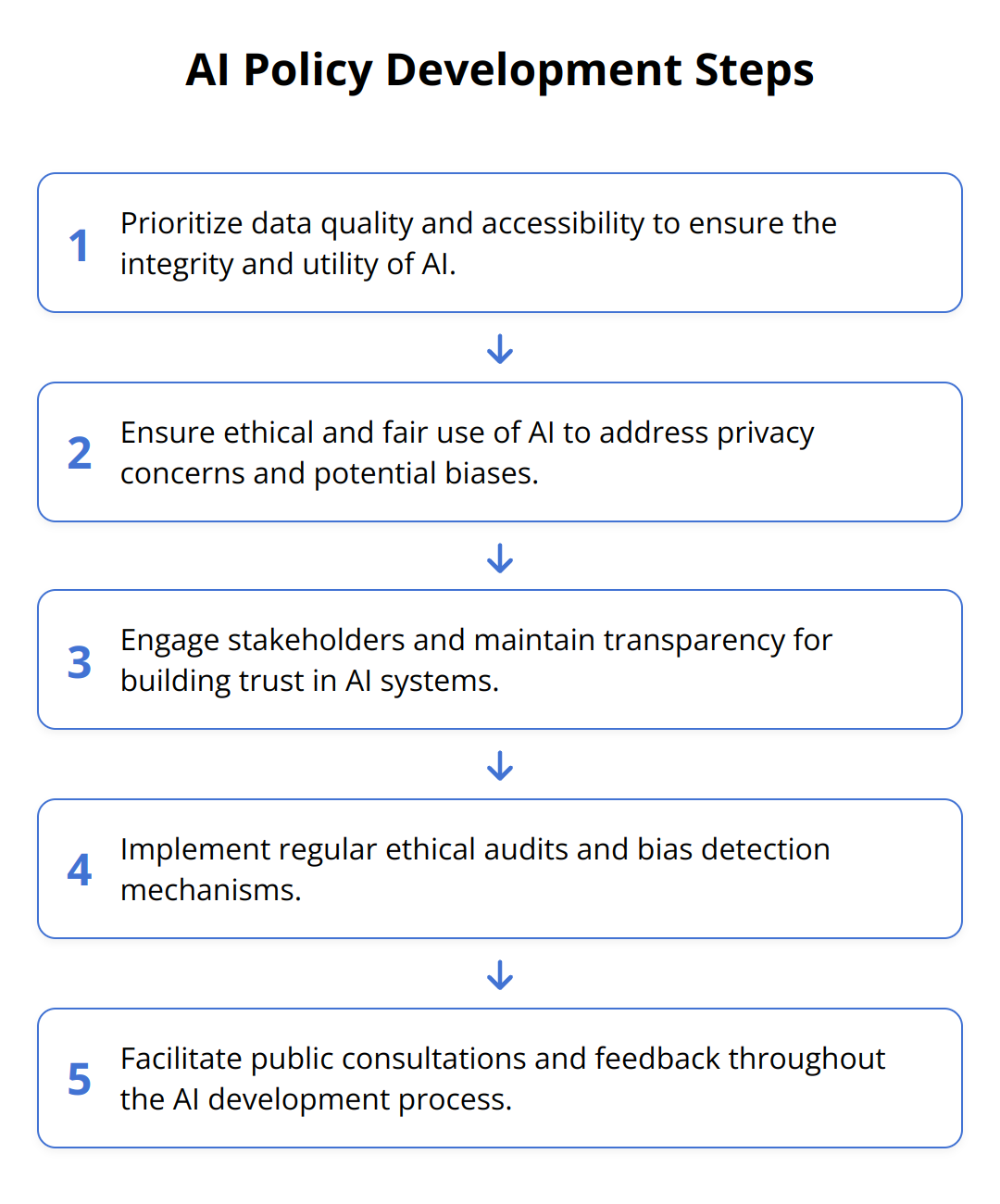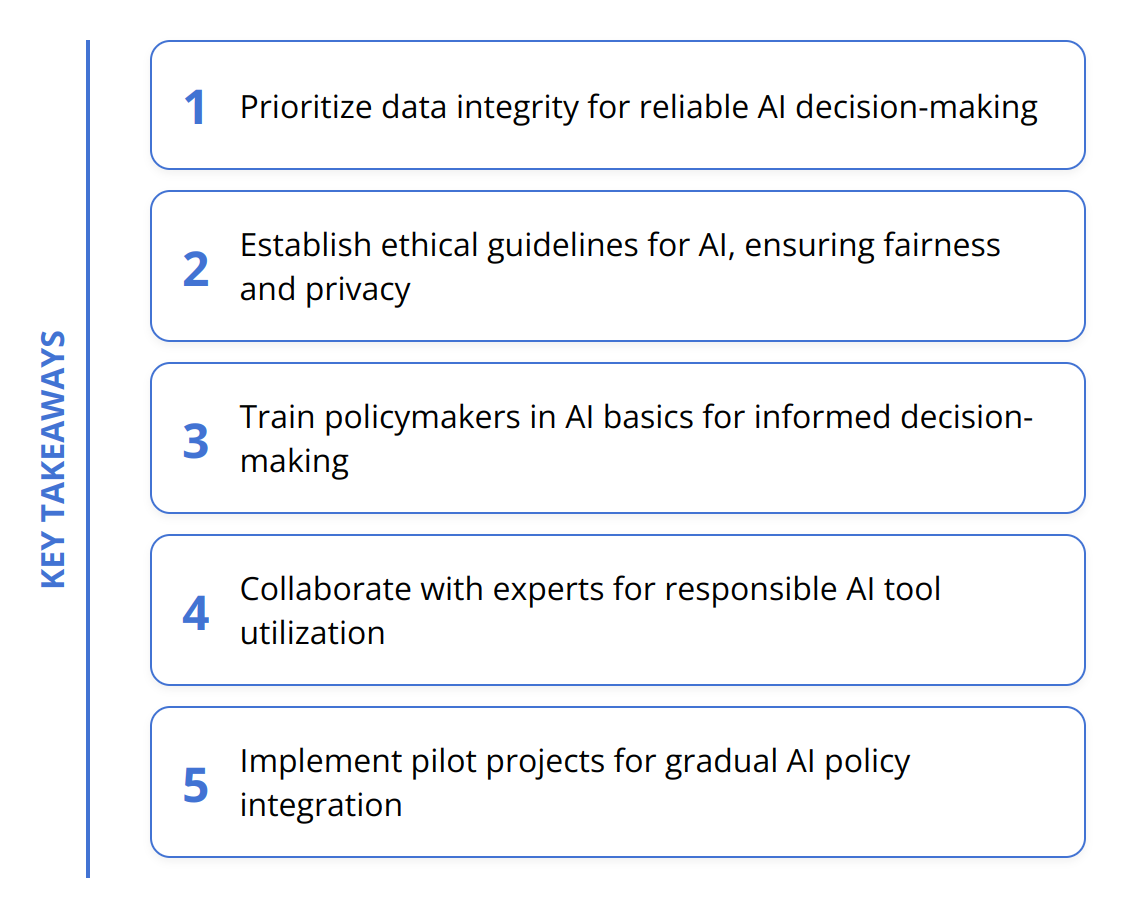At FutureWave Research, we’re deeply invested in exploring the transformative impact of technology on society. Artificial Intelligence (AI) stands at the forefront of these changes, especially in the realm of policy making. This post explores how AI is currently shaping policy decisions and offers practical advice on integrating AI responsibly and effectively into policy development.
Given its potential, understanding how to navigate the complexities of AI-driven policy making is essential for crafting informed, forward-thinking policies.
Navigating AI in Policy Making
Artificial Intelligence (AI) isn’t just a buzzword—it’s a transformative force reshaping policy making. Let’s break down how this happens and provide actionable advice for integrating AI into policy development effectively.
The Power of AI in Analysis and Decision-making
At its core, AI excels in analyzing vast datasets much faster and more accurately than humans ever could. This capability is particularly relevant in policy making, where decisions can affect millions and need to be based on comprehensive data analysis. The power of AI to detect patterns and predict outcomes makes it an invaluable tool for policy analysts. They can leverage AI to forecast trends in economic growth, healthcare, environmental changes, and more, ensuring decisions are backed by robust analyses.

Examples of AI Application
Consider how AI is already influencing policy decisions. In healthcare, AI algorithms are used to predict disease outbreaks, allowing governments to allocate resources more efficiently and save lives. Environmental agencies use AI to monitor climate change indicators, crafting policies to combat adverse effects with precision.

Strategies for Effective AI Integration
- Data Quality is Key: For AI to be effective, the data it analyzes must be accurate, complete, and unbiased. Policymakers must prioritize data integrity to ensure AI-based decisions are reliable.
- Ethical Considerations Cannot Be Overlooked: The use of AI in policy making introduces ethical challenges, particularly around privacy, bias, and data protection. Policies governing AI use must be established, emphasizing ethical AI use that respects citizens’ rights and values.
- Build AI Literacy Among Policymakers: To fully harness AI’s potential, policymakers and policy analysts must understand the basics of AI technologies. Training programs can equip them with the necessary knowledge to make informed decisions about AI initiatives.

- Collaborate with Experts: The complexity of AI calls for collaboration between policymakers, AI researchers, and industry experts. By working together, they can ensure AI tools are used effectively and responsibly.
In Conclusion
AI-powered policy making holds the promise of more informed, efficient, and impactful decisions. However, realizing this potential requires careful attention to data quality, ethical considerations, education, and collaboration. By addressing these aspects, policymakers can leverage AI to create policies that better serve the public and address complex challenges of the 21st century.
AI Policy Essentials
Integrating Artificial Intelligence (AI) into policy development is not just about leveraging technology; it’s about reshaping the way decisions are made to better serve societies. The foundation for effective AI-driven policy making lies in prioritizing data quality, ensuring ethical AI use, and engaging stakeholders while maintaining transparency.
Prioritize Data Quality and Accessibility
High-quality, accessible data is the lifeblood of AI. Without it, even the most sophisticated AI models are rendered ineffective. Policies should mandate rigorous data collection and management protocols to ensure the integrity and reliability of data used in AI applications. This includes implementing standards for data accuracy, completeness, and bias mitigation. An example is the European Union’s GDPR, which sets a benchmark for data protection and governance that can be adapted for AI policy frameworks.
Ensure Ethical and Fair AI Use
AI in policy making carries profound ethical implications, from privacy concerns to the potential for bias. It is imperative to design AI systems that are fair, transparent, and accountable. Policies must include frameworks for regular ethical audits of AI systems, guidelines for bias detection and correction, and mechanisms for addressing any ethical breaches. Tools like AI ethics checklists and impact assessments can be practical resources for policymakers.
Drive Stakeholder Engagement and Transparency
Engaging with a broad spectrum of stakeholders, including the public, is essential for building trust in AI-driven policies. Transparent communication about how AI is used, the benefits it brings, and the measures taken to mitigate risks is crucial. Policies should encourage public consultations and feedback loops throughout the AI development and deployment processes. Transparency can be further enhanced by making AI algorithms and decision-making processes accessible for review by independent experts.

By emphasizing these key considerations, policy makers can harness the potential of AI to make well-informed decisions that effectively address societal challenges.
Following these development steps will not only maximize the benefits of AI in policy development but also safeguard against its potential risks, ensuring that AI serves as a tool for the greater good.
Implementing AI in Policymaking
Successfully integrating Artificial Intelligence (AI) into the policymaking process necessitates a strategic approach rooted in expertise, experimentation, and ongoing assessment. The following insights are designed to guide policymakers through the practical steps of incorporating AI technologies for better decision-making and policy development.
Building Expert Teams
A foundational step is assembling a skilled team that bridges AI technical knowledge with policy expertise. This team’s ability to understand both the potential and the limitations of AI is paramount. For instance, AI experts can navigate the complexities of machine learning algorithms, while policy experts ensure these technologies align with societal needs and ethical considerations. Ideal team composition includes data scientists, AI ethics specialists, policy analysts, and legal advisors. Such a multifaceted team can effectively translate AI capabilities into actionable policy insights.
Starting with Pilot Projects
Before rolling out AI-powered policy initiatives on a large scale, initiating pilot projects is a wise strategy. Pilot projects serve as a testing ground, helping to refine AI applications in a controlled environment. For instance, a local government might start with a pilot project to use AI in analyzing traffic patterns before implementing broad transportation policies. This step-by-step approach allows policymakers to assess the effectiveness, identify any unforeseen challenges, and adjust strategies accordingly. It also provides an opportunity to gauge public and stakeholder reactions, ensuring broader acceptance and support for future initiatives.
Emphasizing Continuous Evaluation
Once AI tools are deployed in the policymaking process, continuous monitoring and evaluation become indispensable. This involves setting up mechanisms to assess both the performance of AI systems and the impact of AI-driven policies. Key performance indicators (KPIs) specific to the policy goals must be establishe alongside regular audits to check for AI system bias, data integrity issues, or ethical concerns. Feedback loops, where insights from evaluations lead to adjustments in AI applications or policy directions, ensure the system remains responsive and effective.

These practical steps are not just about leveraging technology; they’re about creating a dynamic policymaking environment where AI serves as a tool for enhanced decision-making, responsiveness, and societal improvement. As the integration of AI into policy evolves, so too should the strategies for its implementation, always with an eye toward ethical use, public good, and adaptable governance.
For further insights on ethical AI use, visiting AI Ethics Framework could be beneficial.
Remember, the journey to integrate AI into policy making is a continuous learning process, requiring adaptability, openness to new knowledge, and commitment to societal values.
Wrapping Up
The journey towards integrating Artificial Intelligence (AI) in policy making is not only transformative but essential in the fast-paced world we live in. AI has demonstrated its vast potential to reshape public sector decisions, making them more informed, efficient, and impactful. From analyzing large datasets to predicting future trends, AI empowers policymakers to address complex issues with a level of precision previously unattainable.

Moreover, the ethical use of AI in policy making ensures that these advancements benefit all sections of society while respecting privacy and reducing biases. It’s a challenging yet rewarding endeavor that requires ongoing education, stakeholder engagement, and transparent communication.
We at FutureWave Research believe that the future of societal betterment lies in harnessing the power of technology, and AI stands as a testament to this belief. We encourage further research and adoption of AI in the public sector, understanding that it’s an evolving field with immense potential for positive change.
As we continue to explore the possibilities of AI and other emerging technologies, we invite you to join us in this journey. By staying informed and open to adopting new methodologies, we can collectively enhance the societal decision-making process and achieve greater public good.
For more insights into how technology can shape the future, visit FutureWave Research.
In essence, embracing AI in policy making is not just about improving decision-making processes; it’s about creating a future where technology and society align more closely than ever before. Together, let’s embrace this journey, recognizing the challenges and celebrating the opportunities that AI brings to public sector decision-making.

